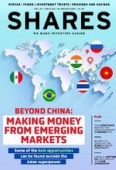Archived article
Please note that tax, investment, pension and ISA rules can change and the information and any views contained in this article may now be inaccurate.
Which chancellors of the exchequer have been best for the UK stock market?

The Conservative Party’s Benjamin Disraeli, twice prime minister and thrice chancellor of the exchequer, once said of his bitterest political rival, who held each post on four occasions: ‘Well, if Mr Gladstone fell into the Thames that would be a misfortune; and if anybody pulled him out, that would be a calamity.’
The Tories’ latest Chancellor, Rishi Sunak, will be hoping for a warmer welcome for Wednesday’s Budget (3 March) and he is likely to measure success in terms of jobs, economic growth and ultimately opinion polls and votes.
Investors will be looking to their portfolios to gauge the effect of his policies and history suggests that the UK stock market has, for whatever reason, done better on average under Conservative chancellors than Labour ones, at least once inflation is taken into account.
PARTY ON
Since the inception of the FTSE All-Share index in 1962, the UK has had 17 chancellors, 12 of whom have been Conservative and five Labour.
At first glance, there is nothing in it between the two parties. Under Conservative chancellors, the FTSE All-Share has chalked up a total capital gain of 355%, in nominal terms.

That equates to an average advance per chancellor of 32.1% (including Macleod’s brief term with that of his successor, Anthony Barber), while under Labour the benchmark has risen by 161% for an average gain of 32.2%.
Across 34 years of Tory chancellorships that is a compound annual growth rate (CAGR) of 4.5% against 4.1% under 24 years of Labour in 11 Downing Street and two of the top-five best spells under a single chancellor actually come under Labour, again in nominal terms.
However, the picture changes profoundly when inflation is taken into account and capital returns from the FTSE All-Share are assessed in real (post-inflation) terms rather than nominal ones.
Here, Conservative chancellors come out well on top, as the withering effect of inflation upon investors’ returns from the stock market under Labour’s Healey chancellorship of the mid-to-late 1970s comes into play.

It must be noted that inflation also chewed up the nominal gains made by the FTSE All-Share under the Tory chancellors Sir Geoffrey Howe (1979-83) and Tony Barber (1970-74).
BEWARE A RETURN TO BARBER
As financial markets today ponder whether inflation is about to make a return, and the yield on the benchmark UK ten-year bond, or gilt, rises as prices fall, a repeat of the ‘Barber Boom’ is something that Sunak will be determined to avoid, even if he will be looking to support and boost growth as best he can, as the economic fall-out that followed was very painful for the UK and so painful that the Tories fell from office after a pair of general elections in 1974.
Not all of the inflation that tore through the British economy could be laid at the door of Barber’s policies, as the 1973 oil price shock had a huge amount to do with it, and this highlights the importance of factors which are beyond the control of any chancellor, no matter how diligent or skilled.
Alastair Darling could hardly have expected to inherit the 2007/8 financial crisis which prompted a deep recession and a wicked bear stock market. Norman Lamont inherited British membership of the Exchange Rate Mechanism, fought to defend the pound and a policy in which he did not believe and oversaw a devaluation of sterling which actually helped the FTSE All-Share to rally.

Sunak has had to contend with Covid-19 and the worst recession for three centuries, so perhaps he has been given the worst hand of all.
Even so, investors, looking at the world through the narrow perspective of their portfolios, will be wanting Sunak to think back to Barber. Inflation mangled portfolio returns for much of the 1970s and all the way through to the Thatcher-Howe prime Minister-chancellor team of 1979-83. Bizarre as it may sound, markets may therefore want to see a little inflation – and growth – but not too much, especially as any sustained surge in prices could force bond yields higher and even oblige the Bank of England to act and raise interest rates.
Markets came close to falling out of bed last week, as they pondered such a prospect, so as ever Sunak has a difficult balancing act going forward, as he juggles growth, jobs, the deficit and inflation, as well as votes.
Important information:
These articles are provided by Shares magazine which is published by AJ Bell Media, a part of AJ Bell. Shares is not written by AJ Bell.
Shares is provided for your general information and use and is not a personal recommendation to invest. It is not intended to be relied upon by you in making or not making any investment decisions. The investments referred to in these articles will not be suitable for all investors. If in doubt please seek appropriate independent financial advice.
Investors acting on the information in these articles do so at their own risk and AJ Bell Media and its staff do not accept liability for losses suffered by investors as a result of their investment decisions.
Issue contents
Editor's View
Feature
First-time Investor
Great Ideas
- Buy Dotdigital, among the UK’s few, true software growth businesses
- Panoply seeds growth opportunity with biggest ever acquisition
- Buy Lindsell Train UK Equity for strong short and long-term returns
- Supermarket Income REIT appeals as a steady investment purely for dividends
- Eurofins beats forecasts and raises guidance again

 magazine
magazine








